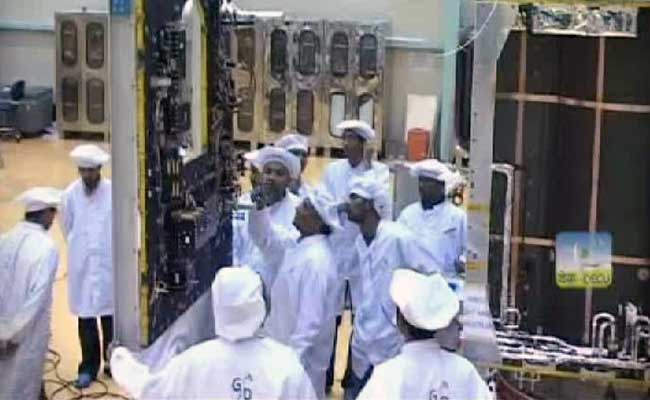70 engineers are at work to build two satellites in six months, ISRO is overseeing the process.
Bengaluru:
India, which has set its eyes to be a serious player in the multi-billion dollar satellite industry, has roped in the private sector to manufacture satellites. After conducting 150 missions over three decades, the country's nodal space agency ISRO has tasked a consortium to make two big satellites for India's navigation system.
Alpha Design Technologies, which will lead the consortium, is a Rs 400-crore defence equipment supplier. But ISRO is expected to take the firm though the complex process of development - which can take at least six months. Already, a team of 70 engineers is working hard to make a flight ready satellite.
On an average, India needs around 17 satellites a year for communication, weather prediction and other. The larger and more complex satellites that are capable of multi-tasking can weigh 1.5 tonnes and above. Of these, ISRO, with its current capacity, cannot meet the target.

Admitting the gap between "requirement versus capability", Dr M Annadurai, the Director of the ISRO Satellite Center, said they want industry to fill it. "I think the requirement we are foreseeing is nearly 16 to 17 satellites per year that we have to make. So it is a really, really, quantum jump," he said.
As of now, with seven satellites in orbit, the NAVIC or the Swadeshi GPS system is fully functional. But to be on the safe side, ISRO needed two spare satellites on the ground for quick launch in case something went wrong.
At ISRO, scientists say they also want to seed an ecosystem where the private sector takes the lead in future.
Lately, India has broken into the satellite launch industry, releasing a record 104 satellites into space in February, many of which belonged to other nations. For now, it is regarded as a low-cost, reliable space power. But building satellites for other nations is a long term goal not only to add muscle to space programme, but to take it to the next level in the space market.
Satellite fabrication requires high precision. It costs hundreds of crores and after launch are expected to remain functional for up to 10 years, with no scope for repair. "It is a challenging task for any Indian company to undertake assembly, integration and testing of a satellite," said Colonel H S Shankar of Alpha Designs, the man leading the consortium.
Alpha Design Technologies, which will lead the consortium, is a Rs 400-crore defence equipment supplier. But ISRO is expected to take the firm though the complex process of development - which can take at least six months. Already, a team of 70 engineers is working hard to make a flight ready satellite.
On an average, India needs around 17 satellites a year for communication, weather prediction and other. The larger and more complex satellites that are capable of multi-tasking can weigh 1.5 tonnes and above. Of these, ISRO, with its current capacity, cannot meet the target.

Alpha Design Technologies will lead the consortium that will build two satellites.
Admitting the gap between "requirement versus capability", Dr M Annadurai, the Director of the ISRO Satellite Center, said they want industry to fill it. "I think the requirement we are foreseeing is nearly 16 to 17 satellites per year that we have to make. So it is a really, really, quantum jump," he said.
As of now, with seven satellites in orbit, the NAVIC or the Swadeshi GPS system is fully functional. But to be on the safe side, ISRO needed two spare satellites on the ground for quick launch in case something went wrong.
At ISRO, scientists say they also want to seed an ecosystem where the private sector takes the lead in future.
Lately, India has broken into the satellite launch industry, releasing a record 104 satellites into space in February, many of which belonged to other nations. For now, it is regarded as a low-cost, reliable space power. But building satellites for other nations is a long term goal not only to add muscle to space programme, but to take it to the next level in the space market.
Satellite fabrication requires high precision. It costs hundreds of crores and after launch are expected to remain functional for up to 10 years, with no scope for repair. "It is a challenging task for any Indian company to undertake assembly, integration and testing of a satellite," said Colonel H S Shankar of Alpha Designs, the man leading the consortium.

